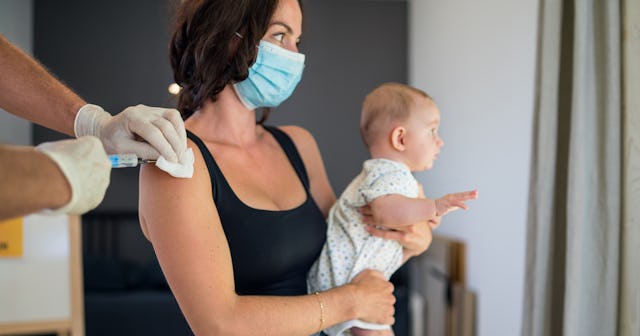New Research Shows That Parents' Covid-19 Vaccination Extends Protection To Unvaccinated Children

A new Israeli study suggests that by getting vaccinated, parents are not only protecting themselves, but also their children from getting infected with Covid-19
Okay, first things first: if you have a child who is eligible for the Covid-19 vaccination, getting them vaccinated is the biggest protection you can give them against the virus. Still, for some children, getting vaccinated is not an option. The good news is, according to this new study published in the peer-reviewed Science journal indicates that even just having two vaccinated parents helps lower the risk of household infection from adults to children. Shocking, right?
Okay, so maybe this isn’t news to most of us, but experts are hoping that this new insight will inspire some of the 30 million unvaccinated American adults to finally get jabbed.
“If the individuals we happen to be speaking with are very child-focused, then some of this may persuade and reassure them,” said Dr. William Schaffner, a specialist in infectious diseases at Vanderbilt University, told Los Angeles Times.
The study was a collaboration between Harvard Medical School, Ben Gurion University, and Israel’s largest healthcare organization, Clalit Research Institute. The study looked at households with unvaccinated children under the age of 16 from January 2021 to September 2021, before the Omicron variant was as rampant as it is now.
Between January and March, when the Alpha variant was making its rounds, researchers discovered that having one vaxxed parent was associated with a 26% lower risk of a child getting infected. Two vaccinated parents make the risk significantly less, around 72% lower, to be exact.
Between July and September 2021, when the Delta variant was the culprit behind breakthrough cases of Covid, having a boosted parent lowered the risk of infection by 21% for children in the household, while having two parents in the home boosted was associated with a 58% lower risk for children. The research also suggested that if a parent were to become infected, their chance of passing it on to kids in the household was much lower than if they were unvaccinated and passed it to their child.
Previous research shows that children’s health during the pandemic relies heavily on indirect vaccine effects
During previous phases of the pandemic (yes, we are in phases of this), research suggested that vaccinated parents were less likely to bring the virus into the home, therefore being less likely to infect children. And although the virus seems to be much milder for children than adults on average, there is still the risk of Long Covid and other health complications down the line post-infection.
Since the Centers for Disease Control and Prevention (CDC) recommended Pfizer’s Covid vaccine for kids ages 5-11 back in December, roughly 28.1% of children in that age bracket have received at least one dose of the vaccine.